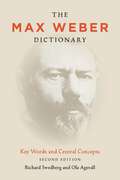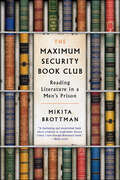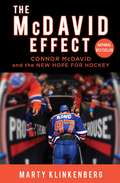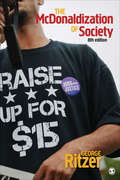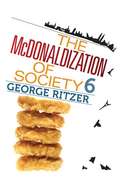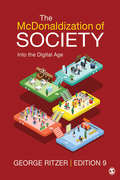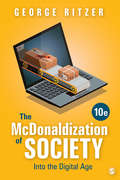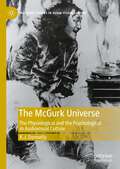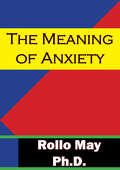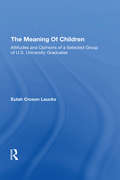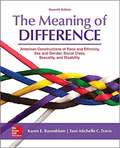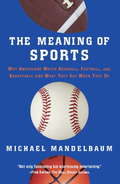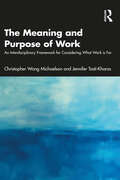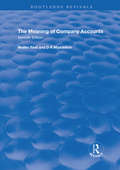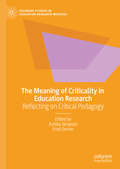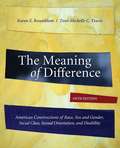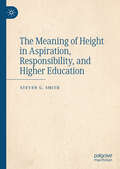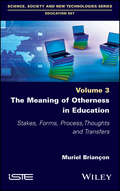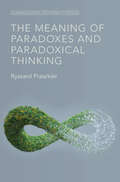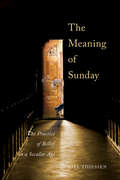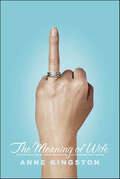- Table View
- List View
The Max Weber Dictionary: Key Words and Central Concepts, Second Edition
by Richard Swedberg Ola AgevallMax Weber is one of the world's most important social scientists, but he is also one of the most notoriously difficult to understand. This revised, updated, and expanded edition of The Max Weber Dictionary reflects up-to-the-moment threads of inquiry and introduces the most recent translations and references. Additionally, the authors include new entries designed to help researchers use Weber's ideas in their own work; they illuminate how Weber himself thought theorizing should occur and how he went about constructing a theory. More than an elementary dictionary, however, this work makes a contribution to the general culture and legacy of Weber's work. In addition to entries on broad topics like religion, law, and the West, the completed German definitive edition of Weber's work (Max Weber Gesamtausgabe) necessitated a wealth of new entries and added information on topics like pragmatism and race and racism. Every entry in the dictionary delves into Weber scholarship and acts as a point of departure for discussion and research. As such, this book will be an invaluable resource to general readers, students, and scholars alike.
The Maximum Security Book Club: Reading Literature in a Men's Prison
by Mikita BrottmanA riveting account of the two years literary scholar Mikita Brottman spent reading literature with criminals in a maximum-security men’s prison outside Baltimore, and what she learned from them—Orange Is the New Black meets Reading Lolita in Tehran.On sabbatical from teaching literature to undergraduates, and wanting to educate a different kind of student, Mikita Brottman starts a book club with a group of convicts from the Jessup Correctional Institution in Maryland. She assigns them ten dark, challenging classics—including Conrad’s Heart of Darkness, Shakespeare’s Macbeth, Stevenson’s Dr. Jekyll and Mr. Hyde, Poe’s story “The Black Cat,” and Nabokov’s Lolita—books that don’t flinch from evoking the isolation of the human struggle, the pain of conflict, and the cost of transgression. Although Brottman is already familiar with these works, the convicts open them up in completely new ways. Their discussions may “only” be about literature, but for the prisoners, everything is at stake.Gradually, the inmates open up about their lives and families, their disastrous choices, their guilt and loss. Brottman also discovers that life in prison, while monotonous, is never without incident. The book club members struggle with their assigned reading through solitary confinement; on lockdown; in between factory shifts; in the hospital; and in the middle of the chaos of blasting televisions, incessant chatter, and the constant banging of metal doors.Though The Maximum Security Book Club never loses sight of the moral issues raised in the selected reading, it refuses to back away from the unexpected insights offered by the company of these complex, difficult men. It is a compelling, thoughtful analysis of literature—and prison life—like nothing you’ve ever read before.
The McDavid Effect: Connor McDavid and the New Hope for Hockey
by Marty KlinkenbergStep into the streets, arenas, coffee shops, and offices of Edmonton, and witness how the arrival of a teenage hockey phenomenon is changing the city's fortunes.Once known as the City of Champions, Edmonton is at a crossroads. As oil prices continue to plummet, the economic outlook grows bleaker by the day. Political changes have ushered in an era of uncertainty. And, as though mirroring the city's fortunes, the Edmonton Oilers continue to struggle on the ice, offering little solace or escape to the city's long-suffering hockey fans. But on June 26, 2015, hope was reborn in Edmonton. With the first overall pick in the NHL Entry Draft, the Edmonton Oilers selected Connor McDavid, a once-in-a-generation talent who, at only eighteen years old, was already being compared to the Great One who had preceded him twenty-five years earlier. Sparked by the arrival of McDavid, the construction of a new state-of-the-art hockey arena, and the development of a revitalized downtown core, a new sensibility began to emerge in Edmonton. Sensing an opportunity, the city started to rebuild and rebrand itself in search of a new future. Through exclusive access, uplifting anecdotes, and colourful interviews, The McDavid Effect traces the renewal of not just a hockey team, but of an entire city. Reflecting the multitude of viewpoints that make up Edmonton--from Connor himself to construction crews at work on the downtown development to business executives directing the new shape of the Albertan capital--The McDavid Effect paints a portrait of the city as it is being reimagined, captures the near-religious reverence people have for sports, and shows how the people of Edmonton are coming to hope again.
The McDonaldization of Society
by Dr George RitzerNow in its Eighth Edition, George Ritzer's McDonaldization of Society continues to stand as one of the pillars of modern day sociological thought. By linking theory to 21st century culture, this book resonates with students in a way that few other books do, opening their eyes to many current issues, especially in the areas of consumption and globalization. Through vivid, story-telling prose, Ritzer provides an insightful introduction to the ways in which the principles of the fast-food restaurant are coming to dominate sectors of American society as well as the rest of the world. This new edition has been fully updated to include a new focus on McDonaldization of the workforce.
The McDonaldization of Society 6, Sixth Edition
by George RitzerThe book demonstrates the power of the sociological imagination to today's readers in a way that few other books have, linking theory to contemporary pop-culture examples that resonate with 21st-century students. This Sixth Edition includes a new concluding Chapter 10 The DeMcDonaldization Society? that examines recent phenomena like Web 2.0 and its relationship to the McDonaldization thesis.
The McDonaldization of Society: Into the Digital Age
by Dr George RitzerThe book that made "McDonaldization" part of the lexicon of contemporary sociological theory, read by hundreds of thousands of students, is now in its Ninth Edition! George Ritzer's seminal work of critical sociology, The McDonaldization of Society, continues to stand as one of the pillars of modern day sociological thought. Building on the argument that that the fast food restaurant has become the model for the rationalization process today, this book links theory to contemporary life in a globalized world and resonates with students in a way that few other books do. Ritzer opens students’ eyes to many current issues and shows how McDonaldization’s principles apply to other settings, especially in the areas of consumption and globalization. Through vivid story-telling prose, Ritzer provides an insightful introduction to this fascinating topic and aids students' critical development. This new edition has been fully updated to include a new focus on McDonaldization in the digital world.
The McDonaldization of Society: Into the Digital Age
by Dr George RitzerThe book that made "McDonaldization" part of the lexicon of contemporary sociological theory, read by hundreds of thousands of students, is now in its Ninth Edition! George Ritzer's seminal work of critical sociology, The McDonaldization of Society, continues to stand as one of the pillars of modern day sociological thought. Building on the argument that that the fast food restaurant has become the model for the rationalization process today, this book links theory to contemporary life in a globalized world and resonates with students in a way that few other books do. Ritzer opens students’ eyes to many current issues and shows how McDonaldization’s principles apply to other settings, especially in the areas of consumption and globalization. Through vivid story-telling prose, Ritzer provides an insightful introduction to this fascinating topic and aids students' critical development. This new edition has been fully updated to include a new focus on McDonaldization in the digital world.
The McDonaldization of Society: Into the Digital Age
by George RitzerRecipient of a 2021 McGuffey Longevity Award from the Textbook & Academic Authors Association (TAA) The book that made "McDonaldization" part of the lexicon of contemporary sociological theory, read by hundreds of thousands of students, is now in its Tenth Edition. George Ritzer′s seminal work of critical sociology, The McDonaldization of Society, continues to stand as one of the pillars of modern sociological thought. Building on the argument that the fast food restaurant has become the model for the rationalization process today, this book links theory to contemporary life in a globalized world. Ritzer opens our eyes to many current issues and shows how McDonaldization’s principles—efficiency, calculability, predictability, and control—have been applied to other sectors of American society and throughout the world. This new edition continues to shift its focus to how we experience McDonaldization online, the new locus of production and consumption in the digital age.
The McDonaldization of Society: Into the Digital Age
by George RitzerRecipient of a 2021 McGuffey Longevity Award from the Textbook & Academic Authors Association (TAA) The book that made "McDonaldization" part of the lexicon of contemporary sociological theory, read by hundreds of thousands of students, is now in its Tenth Edition. George Ritzer′s seminal work of critical sociology, The McDonaldization of Society, continues to stand as one of the pillars of modern sociological thought. Building on the argument that the fast food restaurant has become the model for the rationalization process today, this book links theory to contemporary life in a globalized world. Ritzer opens our eyes to many current issues and shows how McDonaldization’s principles—efficiency, calculability, predictability, and control—have been applied to other sectors of American society and throughout the world. This new edition continues to shift its focus to how we experience McDonaldization online, the new locus of production and consumption in the digital age.
The McGurk Universe: The Physiological and the Psychological in Audiovisual Culture (Palgrave Studies in Audio-Visual Culture)
by K.J. DonnellyThis book reconsiders audiovisual culture through a focus on human perception, with recourse to ideas derived from recent neuroscience. It proceeds from the assumption that rather than simply working on a straightforward cognitive level audiovisual culture also functions more fundamentally on a physiological level, directly exploiting precise aspects of human perception. Vision and hearing are unified in a merged signal in the brain through being processed in the same areas. This is illustrated by the startling ‘McGurk Effect’, whereby the perception of spoken sound is changed by its accompanying image, and counterpart effects which demonstrate that what we see is affected by different sounds accompanying sounds. This blending of sound and images into a whole has become a universal aspect of culture, not only evident in films and television but also in video games and short Internet clips. Indeed, this aesthetic formation has become the dominant of this period. The McGurk Universe attends to how audiovisual culture engages with and mediates between physiological and psychological levels.
The Meaning Of Anxiety
by Rollo MayWhen this important work was originally published in 1950--the first book in this country on anxiety--it was hailed as a work ahead of its time.This book is the result of several years of exploration, research, and thought on one of the most urgent problems of our day. Clinical experience has proved to psychologists and psychiatrists generally that the central problem in psychotherapy is the nature of anxiety. To the extent that we have been able to solve that problem, we have made a beginning in understanding the causes of integration and disintegration of personality.But if anxiety were merely a phenomenon of maladjustment, it might well be consigned to the consulting room and the clinic and this book to the professional library. The evidence is overwhelming, however, that men and women of today live in an "age of anxiety." If one penetrates below the surface of political, economic, business, professional, or domestic crises to discover their psychological causes, or if one seeks to understand modern art or poetry or philosophy or religion, one runs athwart the problem of anxiety at almost every turn. There is reason to believe that the ordinary stresses and strains of life in the changing world of today are such that few if any escape the need to confront anxiety and to deal with it in some manner.This study seeks to bring together in one volume the theories of anxiety offered by modern explorers in different areas of our culture, to discover the common elements in these theories, and to formulate these concepts so that we shall have some common ground for further inquiry. If the synthesis of anxiety theory presented here serves the purpose of producing some coherence and order in this field, a good part of the writer's goal will have been achieved.
The Meaning Of Children: Attitudes And Opinions Of A Selected Group Of U.s. University Graduates
by Eulah Croson LaucksAs more individuals delay having children or opt for childlessness, the question arises: What value do people place on children in contemporary U.S. society? Dr. Laucks studies this question through a survey designed to elicit attitudes regarding the purpose and desirability of raising children in the context of a depersonalized, fragmented, and alienating society. The survey – of a large group of university graduates – points to marked discrepancies between individual attitudes favoring procreation and parenthood and individual actions that contradict traditional notions. Purported aspirations and goals still include the hope of raising happy, healthy children. Yet, while individually valuing children and family, Americans widely approve of and use contraceptives and other birth control methods, endorse easy dissolution of marriage, and approve of relationships that exclude children. The author examines these diverging attitudes in relation to contemporary and historical sentiments toward the family. Extensive tables display the detailed results of Dr. Laucks’s survey, giving demographic information on the respondents, along with their attitudes toward sexual practices, parenthood, child rearing, and the family.
The Meaning Of Difference: American Constructions Of Race And Ethnicity, Sex And Gender, Social Class, Sexuality, And Disability
by Karen E. Rosenblum Toni-Michelle C. TravisHow do categories of people come to be seen as “different”? How does being “different” affect people’s lives? What does difference mean at the level of the individual, social institutions, or society? What difference does “difference” make? The Meaning of Difference offers a conceptual structure and up-to-date readings on the differences distinctive to American life―differences of race and ethnicity, sex and gender, social class, sexuality, and disability.
The Meaning Of Sports
by Michael MandelbaumIn The Meaning of Sports, Michael Mandelbaum, a sports fan who is also one of the nation's preeminent foreign policy thinkers, examines America's century-long love affair with team sports. In keeping with his reputation for writing about big ideas in an illuminating and graceful way, he shows how sports respond to deep human needs; describes the ways in which baseball, football and basketball became national institutions and how they reached their present forms; and covers the evolution of rules, the rise and fall of the most successful teams, and the historical significance of the most famous and influential figures such as Babe Ruth, Vince Lombardi, and Michael Jordan. Whether he is writing about baseball as the agrarian game, football as similar to warfare, basketball as the embodiment of post-industrial society, or the moral havoc created by baseball's designated hitter rule, Mandelbaum applies the full force of his learning and wit to subjects about which so many Americans care passionately: the games they played in their youth and continue to follow as adults. By offering a fresh and unconventional perspective on these games, The Meaning of Sports makes for fascinating and rewarding reading both for fans and newcomers.
The Meaning and Purpose of Work: An Interdisciplinary Framework for Considering What Work is For
by Jennifer Tosti-Kharas Christopher Wong MichaelsonTwo seminal crises of the early 21st century – the 9/11 terrorist attacks and COVID-19 pandemic – have led emerging generations of workers to prioritize the meaning and purpose of work. At the same time, other social and environmental crises are threatening, capitalism is evolving, and technology is advancing. In this book, a philosopher and organizational psychologist who together research meaningful work consider what these forces mean for whether work might give meaning and purpose to our lives or take it away. The authors introduce key concepts – meaning, purpose, and work, among others – and consider how they show up in individuals’ experience of work, what role organizations play in cultivating them, and the responsibilities of markets and states to the individuals and organizations working within them. Each chapter includes questions and prompts for review and reflection for students and workers who read the book. The final chapter concludes by introducing an original “6 P” framework for making sense of the functional and moral purpose of work among individuals, organizations, and systems: to pursue and perform, provide and produce, and price and protect work. Readers will emerge with an understanding of the meaning of meaning as well as a practical appreciation for the role of meaning in their own work, the managerial responsibilities they may have for serving the purpose of the organization they work for, and the societal challenges that make the quest for meaningful work a timely imperative
The Meaning of Company Accounts
by Walter ReidThis title was first published in 2000: The authors' workbook approach provides a treatment of financial accounting practice which readers at differing levels of knowledge can tailor individually to their learning requirements. There is an appendix of photocopiable formats including financial rations and segment analysis.
The Meaning of Company Accounts (Routledge Revivals)
by Walter ReidThis title was first published in 2000: The authors' workbook approach provides a treatment of financial accounting practice which readers at differing levels of knowledge can tailor individually to their learning requirements. There is an appendix of photocopiable formats including financial rations and segment analysis.
The Meaning of Criticality in Education Research: Reflecting on Critical Pedagogy (Palgrave Studies in Education Research Methods)
by Fred Dervin Ashley SimpsonThis book explores, and problematizes, what it means to be ‘critical’ in education research. Drawing together chapters from diverse global perspectives, this volume aims to stimulate dialogue about possible meanings of criticality in education research. In doing so, they question why criticality has become such an essential part of education, and what researchers expect of it. The book opens up and contests some of the deficiencies of criticality in education research: ultimately it is not a global term, but often creates a false binary between East and West. Offering an alternative trajectory to educational narratives surrounding criticality, this book will be of interest and value to scholars of critical pedagogy and comparative education.
The Meaning of Difference: American Constructions of Race, Sex and Gender, Social Class, Sexual Orientation, and Disability (5th Edition)
by Karen E. Rosenblum Toni-Michelle C. TravisThe Meaning of Difference focuses on the social construction of difference as it operates in American formulations of race and ethnicity, sex and gender, social class, sexual orientation, and disability. The conceptual structure of this text-reader comes from four framework essays addressing the construction of difference, the experience of difference, the social meaning of difference, and social action that might bridge differences. Each framework essay is followed by a set of readings selected for readability, conceptual depth, and applicability to a variety of statuses. Boxed inserts throughout offer first-person accounts from real people, many of them students. This edition features an expanded focus on disability and 29 new readings, including articles on how immigration is transforming the nature of American race and ethnic categories, the changing shape of higher education, and the experience of Americans of Middle-Eastern descent.
The Meaning of Height in Aspiration, Responsibility, and Higher Education
by Steven G. SmithThe Meaning of Height takes seriously the traditional figure of “higher life” for intrinsically preferable manners of living. Reworking the Platonic model of ascent to the ideal and descent to responsible engagement with the world, The Meaning of Height lays out concrete possible itineraries of reaching (upward to new acquisitions of personal capacity) and righting (downward from prompts for good order), showing connections between individual and social fulfillment. By focusing on our diversely demanding encounters with the interesting, the important, and the transcendent, the book strikes a counterpoint to the commonly homogenized conception of personal “happiness.” It also counters illiberal views of higher education with a Humboldtian vitality argument for a meaningfully “high” higher education geared to full development of human faculties, a level of education to which the disciplines of philosophy and religious studies make essential contributions. The book concludes by considering the essential role of this sort of higher education in democratic societies.
The Meaning of Otherness in Education: Stakes, Forms, Process, Thoughts and Transfers
by Muriel BriançonThe notion of otherness, often misused, requires important conceptualization work in order for it to be considered in all of its forms, and not simply reduced to the account of others. Although otherness certainly questions the link to the other (relation), it also questions the link to the self (reflexivity) and the link to knowledge (epistemology). Being tridimensional, the process of otherness is a paradox, the meaning of which can only be drawn thanks to ethics, psychoanalytical orientation and the history of philosophical ideas. This book, which relates to philosophy of education, seeks to explain the problematic notion of otherness, the desire for which is specific to humankind. It examines how otherness questions the limits of knowledge, transmission and language, and argues that it is in fact a value, a tool and practice for all the actors involved in the relationship between education, knowledge and care.
The Meaning of Paradoxes and Paradoxical Thinking (Cambridge Series on Possibility Studies)
by Ryszard PraszkierThis interdisciplinary work offers a comprehensive analysis of paradoxes and paradoxical thinking, exploring their manifestations in philosophy, societal dynamics, personality, and neuroscience. Demonstrating various methods for the augmentation of creativity and improved performance, this book uniquely integrates theoretical perspective with case studies and practical applications. As such it elucidates the theory and mechanisms of transforming the apparently impossible into the possible, illustrated by cases of social innovators successfully addressing insurmountable challenges. Aimed at graduate and postgraduate social science students and scholars, with over 500 bibliographical references, the text remains accessible to a broader audience due to its engaging language. Emphasizing the significance of paradoxes and paradoxical thinking in both professional and everyday contexts, it provides a nuanced exploration of paradoxical phenomena, making it a valuable resource for academic and general readers alike.
The Meaning of Sunday
by Joel ThiessenFewer Canadians identify with a religion, believe in a god, or attend weekly religious services than in past decades. What explains higher and lower levels of religiosity? Is secularization a myth or reality? What impact does religiosity or secularity have on a society's social and civil fabric? In The Meaning of Sunday, Joel Thiessen addresses these questions by weaving together narratives from interviews with members of both religious and secular communities. Exploring the meanings and motivations behind people's religious beliefs and behaviours, the book features discussions with three groups of people: those who attend religious services weekly, those who attend services mainly for religious holidays and rites of passage, and those who do not identify with any religious group and never attend religious services. Interview responses show that religiosity levels correlate to one's personal experiences with the supernatural, religious organizations, and social ties with those who either encourage or discourage religious identification, belief, or practice. Concluding that the demand for religion is waning regardless of what religious groups include in their programs, Thiessen suggests that, apart from some initial social and civic concern, Canadian society may be just fine without it. Testing two dominant theories in the sociology of religion - secularization and rational choice theory - The Meaning of Sunday provides in-depth qualitative research on people's "lived religion" and contributes to a major ongoing debate concerning the nature and importance of religion in contemporary society.
The Meaning of Sunday: The Practice of Belief in a Secular Age
by Joel ThiessenFewer Canadians identify with a religion, believe in a god, or attend weekly religious services than in past decades. What explains higher and lower levels of religiosity? Is secularization a myth or reality? What impact does religiosity or secularity have on a society’s social and civil fabric? In The Meaning of Sunday, Joel Thiessen addresses these questions by weaving together narratives from interviews with members of both religious and secular communities. Exploring the meanings and motivations behind people’s religious beliefs and behaviours, the book features discussions with three groups of people: those who attend religious services weekly, those who attend services mainly for religious holidays and rites of passage, and those who do not identify with any religious group and never attend religious services. Interview responses show that religiosity levels correlate to one’s personal experiences with the supernatural, religious organizations, and social ties with those who either encourage or discourage religious identification, belief, or practice. Concluding that the demand for religion is waning regardless of what religious groups include in their programs, Thiessen suggests that, apart from some initial social and civic concern, Canadian society may be just fine without it. Testing two dominant theories in the sociology of religion - secularization and rational choice theory - The Meaning of Sunday provides in-depth qualitative research on people's "lived religion" and contributes to a major ongoing debate concerning the nature and importance of religion in contemporary society.
The Meaning of Wife: A Provocative Look at Women and Marriage in the Twenty-First Century
by Anne Kingston"One part The Beauty Myth . . . and one part Backlash"*--a provocative exploration of who and what a wife really is.There is a wife crisis in North America, a brewing storm of conflicting forces swirling around what it means to be a wife at the beginning of the 21st Century. The word is so fraught with ambiguity that it has become a litmus test, eliciting from women emotions ranging from longing to antipathy, anxiety to derision. This crisis is at the heart of Anne Kingston's The Meaning of Wife.Delving into the complex, troubling, and sometimes humorous contradictions, illusions, and realities of contemporary wifehood, Kingston takes the reader on a fascinating journey into the wedding industrial complex, which elevates the bride to a potent consumer icon; through the recent romanticization of domesticity; and across the conflicted terrain of wifely sexuality. She looks at "wife backlash," and the new wave of neo-traditionalism that urges women to marry before their "best-before" dates expire; explores the apotheosis of abused wives and the strange celebration of wives who kill; and muses on the fact that Oprah Winfrey and Martha Stewart, two of the world's wealthiest and most influential women, are both non-wives whose success has hinged on thier understanding of wives. The result is an entertaining mix of social, sexual, historical, and economic commentary that is bound to stir debate even as it reframes our view of both women and marriage.
